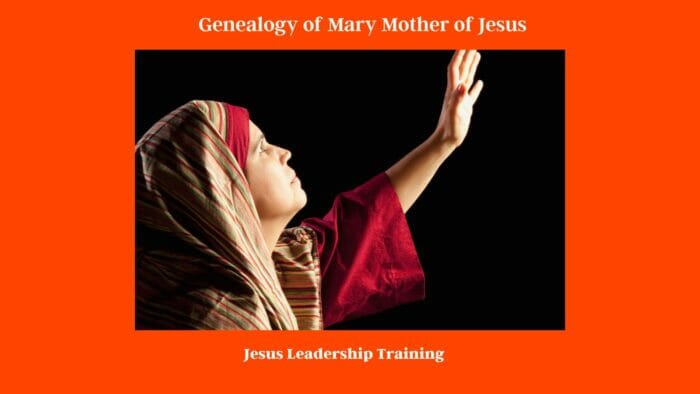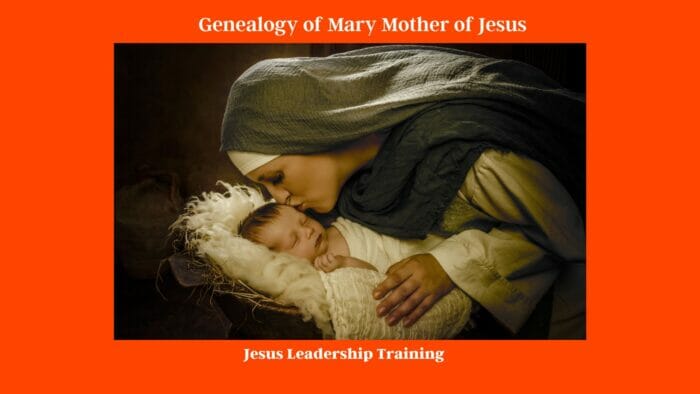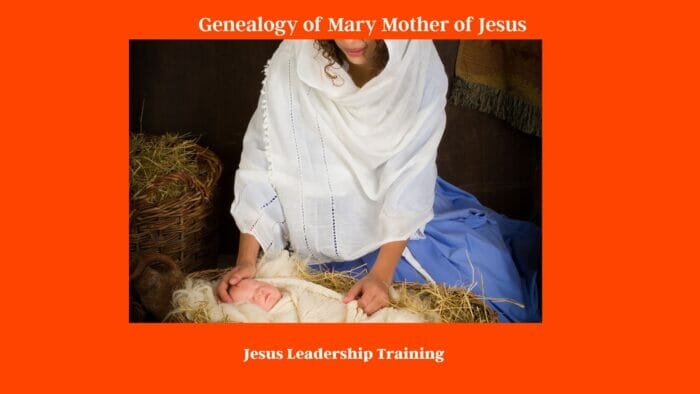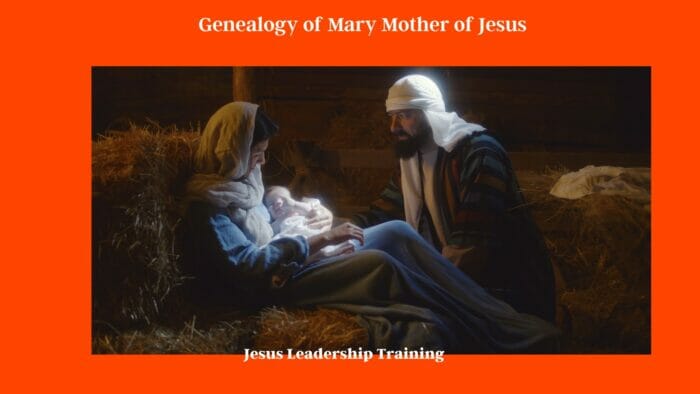The genealogy of Mary, the mother of Jesus, holds a significant place in biblical history and Christian theology. Exploring her ancestral lineage not only offers insights into her family heritage but also sheds light on the fulfillment of ancient prophecies surrounding the birth of Jesus. This article embarks on a captivating journey through Mary’s genealogy, delving into the names, stories, and historical context that intertwine to shape her remarkable lineage. Join us as we uncover the hidden narratives and dive into the rich tapestry of Mary’s ancestry.
Table of Contents
Genealogy of Mary Mother of Jesus (God)
The genealogy of Mary, the mother of Jesus, serves as a testament to the divine plan woven throughout history. Examining her lineage allows us to trace her roots back to prominent figures in biblical chronicles, thereby establishing her connection to ancient prophecies. Let’s explore the captivating genealogical tapestry that unravels the story of Mary’s lineage.
Lineage of Mary (Jesus Mother) from the Book of Luke
The lineage of Mary, the mother of Jesus, is not explicitly given in the Bible. It’s Joseph’s lineage that is specified in the Gospels of Matthew and Luke. However, based on historical, cultural, and biblical clues, it’s believed that Mary also descends from David, but perhaps through a different son than Solomon (the line of Joseph’s ancestry).
15 Remarkable Women Bible Characters: Their Stories and Impact | Bible | Women
The lineage given in Luke (Luke 3:23-38) is often suggested to be Mary’s lineage, due to the unique wording at the beginning of the genealogy. Luke starts with Jesus and traces backward to Adam, but when referring to Jesus, Luke states, “He was the son, so it was thought, of Joseph, the son of Heli…. Some scholars propose that “son of Heli” actually refers to Mary, given Jewish customs of listing only males in genealogies and the peculiarity of Luke’s statement. According to this theory, Heli would be Mary’s father, making him Jesus’ grandfather.

Please note, this is a topic of scholarly debate and the text itself does not definitively state this lineage as being Mary’s. Here is the lineage as presented in Luke 3:23-38:
| Generation | Name |
|---|---|
| 1 | Jesus |
| 2 | Joseph (as supposed) |
| 3 | Heli |
| 4 | Matthat |
| 5 | Levi |
| 6 | Melchi |
| 7 | Jannai |
| 8 | Joseph |
| 9 | Mattathias |
| 10 | Amos |
| 11 | Nahum |
| 12 | Esli |
| 13 | Naggai |
| 14 | Maath |
| 15 | Mattathias |
| 16 | Semein |
| 17 | Eliezer |
| 18 | Jorim |
| 19 | Matthat |
| 20 | Levi |
| 21 | Simeon |
| 22 | Judah |
| 23 | Joseph |
| 24 | Jonan |
| 25 | Eliakim |
| 26 | Melea |
| 27 | Menna |
| 28 | Mattatha |
| 29 | Nathan |
| 30 | David |
| 31 | Jesse |
| … | … |
| 75 | Adam |
| 76 | God |
This is only a portion of the full lineage presented in Luke, from Jesus back to Adam, the first man according to the Bible. Remember, it’s speculative to assign this genealogy to Mary, as the text does not explicitly do so. This lineage, according to Luke, presents Jesus as a son of Adam and God, indicating His identity as both fully human and fully divine.

The Ancestry of Mary: A Journey Through Time
Mary’s ancestral lineage can be traced back to the house of David, as foretold in the Old Testament. Her genealogy, as recorded in the Gospel of Luke, establishes her descent from King David through a line of notable figures, including Nathan, David’s son. This lineage carries great significance, as it aligns with the prophetic scriptures that anticipated the birth of the Messiah from the house of David.
Lineage of Mary (Jesus Mother) from the Book of Matthew
The Gospel of Matthew presents a genealogy of Jesus, but it is primarily focused on the lineage through Joseph, who is recognized as Jesus’s legal father according to Jewish law. This genealogy is traced from Abraham to David, from David to the Babylonian exile, and from the Babylonian exile to Jesus (Matthew 1:1-16).
However, this genealogy is considered as the lineage of Joseph, not Mary. The Bible does not provide an explicit genealogy for Mary. The belief that Mary also descended from David, from a different line than Joseph, comes from traditions and interpretations, not direct biblical text.
Here is the lineage presented in Matthew 1:1-16:
| Generation | Name |
|---|---|
| 1 | Jesus |
| 2 | Joseph (Mary’s husband) |
| 3 | Jacob |
| 4 | Matthan |
| 5 | Eleazar |
| 6 | Eliud |
| 7 | Achim |
| 8 | Zadok |
| 9 | Azor |
| 10 | Eliakim |
| 11 | Abiud |
| 12 | Zerubbabel |
| 13 | Shealtiel |
| 14 | Jeconiah |
| 15 | Josiah |
| 16 | Amon |
| 17 | Manasseh |
| 18 | Hezekiah |
| 19 | Ahaz |
| 20 | Jotham |
| 21 | Uzziah |
| 22 | Joram |
| 23 | Jehoshaphat |
| 24 | Asa |
| 25 | Abijah |
| 26 | Rehoboam |
| 27 | Solomon |
| 28 | David |
| … | … |
| 41 | Abraham |
This lineage connects Jesus to Abraham, the patriarch of the Israelites, and David, Israel’s greatest king, emphasizing Jesus’s Jewish heritage and royal lineage. It’s crucial to note that it does not explicitly state Mary’s lineage, and it is often viewed as Joseph’s lineage.

Please consult with a theologian, Bible scholar, or a trusted religious advisor for more information on biblical genealogies. They can provide a more comprehensive explanation and understanding, including the context, interpretation, and scholarly debates surrounding these genealogies.
The Link to King David: Nathan and Mary’s Lineage
Mary’s lineage is uniquely traced through Nathan, one of David’s sons, rather than his more well-known son, Solomon. This distinction sets her apart and holds a particular theological significance. By tracing her ancestry through Nathan, Mary’s connection to King David is firmly established, emphasizing the fulfillment of divine promises that the Messiah would arise from David’s line.
The Importance of Davidic Lineage in Jewish Culture (Human)
In Jewish culture, the Davidic lineage held immense importance and reverence. The Messiah was believed to descend from the house of David, and the preservation of this ancestral line was crucial for the fulfillment of prophecies. Mary’s genealogy, intertwining with this illustrious lineage, adds weight and authenticity to Jesus’ claim of being the long-awaited Messiah.
Importance Mary in Davidic Lineage in Jewish Culture
Here is a table discussing the importance of Mary in the Davidic lineage in Jewish culture:
| Aspect | Explanation |
|---|---|
| Messianic Prophecies | In the Old Testament, there are prophecies about the Messiah coming from the line of David (see 2 Samuel 7:12-16, Isaiah 9:6-7). If Mary is of Davidic descent, this affirms that Jesus is the promised Davidic Messiah in a biological sense, not just legally through Joseph. |
| Royal Lineage | The Davidic lineage was the royal line in Jewish history, with King David being one of the most revered figures. By linking Mary to this lineage, it would symbolize the royal and significant status of Jesus in Jewish culture. |
| Fulfillment of God’s Promise | God promised David that his kingdom would endure forever (2 Samuel 7:16). Jesus being of Davidic lineage through Mary would be a fulfillment of this promise. |
| Preservation of the Line | The Davidic line had seemingly ended after the Babylonian exile. However, if Mary was from the line of David, this would mean the lineage continued until Jesus, preserving the line. |
| Legal and Biological Claim | In Jewish culture, tribal lineage was passed down paternally. However, if Mary was also of Davidic descent, this would give Jesus both a legal claim (through Joseph) and a biological claim (through Mary) to David’s line, solidifying his role as the Messiah. |
These reasons underline the significance of Mary’s Davidic lineage in Jewish culture. However, it’s important to note that the Bible does not explicitly state Mary’s genealogy, and these interpretations come from tradition and biblical exegesis. The belief in Mary’s Davidic lineage is more prominently held in Christian theology. Consultation with biblical scholars or theologians is advised for a more comprehensive understanding.
A Closer Look at Mary’s Family Tree (Study)
Let’s dive into Mary’s genealogy and explore the notable figures that form her ancestral lineage. Each name and story contributes to the rich tapestry of her heritage, highlighting the divine orchestration behind her birth.
Genealogy of Mary Mother of Jesus: Joseph, Mary’s Husband
Joseph, Mary’s husband, plays a vital role in the genealogy of Jesus. Although not biologically related to Jesus, Joseph’s lineage anchors Mary’s connection to the house of David. As Joseph’s wife, Mary becomes part of his ancestral line, ultimately fulfilling the prophetic promises that the Messiah would descend from David’s line.
Genealogy to Joseph Mary’s Husband
Here is a simplified table displaying Joseph’s genealogy according to the Gospel of Matthew, which traces his lineage back to Abraham. It should be noted that this genealogy lists Joseph as the father of Jesus, in keeping with Jewish custom, even though the Gospel makes it clear that Joseph was not Jesus’s biological father.
| Generation | Ancestor |
|---|---|
| 1 | Abraham |
| 2 | Isaac |
| 3 | Jacob |
| 4 | Judah |
| 5 | Perez |
| 6 | Hezron |
| 7 | Ram |
| 8 | Amminadab |
| 9 | Nahshon |
| 10 | Salmon |
| 11 | Boaz |
| 12 | Obed |
| 13 | Jesse |
| 14 | David |
| 15 | Solomon |
| 16 | Rehoboam |
| 17 | Abijah |
| 18 | Asa |
| 19 | Jehoshaphat |
| 20 | Jehoram |
| 21 | Uzziah |
| 22 | Jotham |
| 23 | Ahaz |
| 24 | Hezekiah |
| 25 | Manasseh |
| 26 | Amon |
| 27 | Josiah |
| 28 | Jeconiah |
| 29 | Shealtiel |
| 30 | Zerubbabel |
| 31 | Abiud |
| 32 | Eliakim |
| 33 | Azor |
| 34 | Zadok |
| 35 | Achim |
| 36 | Eliud |
| 37 | Eleazar |
| 38 | Matthan |
| 39 | Jacob |
| 40 | Joseph |
The gospel of Luke provides a different genealogy for Joseph, tracing it back to Adam and God, highlighting the different purposes and audiences of these two gospels.
Genealogy of Mary Mother of Jesus: Heli, Mary’s Father (Women)
According to Luke’s Gospel, Heli is mentioned as Mary’s father. However, biblical scholars propose that Heli may have been Mary’s father-in-law, and Luke’s genealogy traces Joseph’s lineage through Heli. Regardless of the exact relationship, Heli’s inclusion in Mary’s genealogy further strengthens her connection to the house of David. Checking the legal line, also in Matthews Geanology and Ministry Home. Checking then Actual Line, along with the kingly line.
Genealogy of Mary Mother of Jesus: Matthat, Mary’s Ancestor
Matthat, identified as Mary’s ancestor in Luke’s Gospel, adds another layer to her rich lineage. Although limited information is available about Matthat, his inclusion in the genealogy emphasizes the continuity and significance of Mary’s ancestral heritage
.
Genealogy of Mary Mother of Jesus: Levi, Mary’s Predecessor
Levi, mentioned as Mary’s predecessor, adds depth and historical context to her lineage. Levi’s inclusion underscores the intricate web of ancestry that leads to Mary, solidifying her position within the historical framework of biblical genealogies.
Genealogy of Mary Mother of Jesus: Melchi, Mary’s Forebearer
Melchi, another figure in Mary’s genealogy, further bolsters the authenticity and historical foundation of her lineage. While details about Melchi’s life may be scarce, his place within Mary’s ancestral line contributes to the intricate tapestry of her family heritage.
Genealogy of Mary Mother of Jesus: Jannai, Mary’s Progenitor
Jannai, identified as Mary’s progenitor, adds another intriguing layer to her lineage. Though historical records may offer limited insights into Jannai’s life, his inclusion further deepens our understanding of Mary’s ancestral connection and the divine orchestration of her genealogy. In Matthew Genealogy, David Luke, David Joseph, Jesus Christ, Nazareth, the Virgin, and Herod are also mentioned in Passing
FAQs about the Genealogy of Mary Mother of Jesus
To shed more light on the genealogy of Mary, let’s address some frequently asked questions:
1. Who were Mary’s parents?
Mary’s parents were traditionally believed to be Joachim and Anne, as depicted in early Christian writings. However, the Bible does not explicitly mention the names of Mary’s parents.
2. How does Mary’s genealogy establish Jesus’ Davidic lineage?
Mary’s genealogy, traced through her husband Joseph’s lineage, establishes Jesus’ connection to the house of David. By marrying Joseph, Mary becomes part of his ancestral line, fulfilling the prophecies that the Messiah would be born from David’s lineage.
3. Why is Mary’s genealogy significant?
Mary’s genealogy holds significance as it confirms Jesus’ eligibility as the Messiah by fulfilling the prophecies of his Davidic lineage. It underscores the divine orchestration throughout history, culminating in Jesus’ birth.
4. How does Mary’s genealogy differ from Joseph’s?
Mary’s genealogy differs from Joseph’s in terms of the lineage traced. While Joseph’s genealogy is recorded in the Gospel of Matthew, Mary’s lineage is detailed in the Gospel of Luke. Joseph’s lineage connects to the house of David through Solomon, while Mary’s lineage is traced through Nathan.
5. What do we learn from Mary’s genealogy?
Mary’s genealogy teaches us about the intricate fulfillment of prophecies surrounding the birth of Jesus. It emphasizes the divine plan woven through history and reinforces Jesus’ claim as the long-awaited Messiah.
6. How does Mary’s genealogy impact Christian theology?
Mary’s genealogy plays a crucial role in Christian theology, as it establishes Jesus’ rightful claim to the Davidic lineage. It reinforces the fulfillment of ancient prophecies and highlights the divine nature of Jesus’ birth.
Final Thoughts – Geanology of Mary the Mother of Jesus
Exploring the genealogy of Mary, the mother of Jesus, unveils a captivating narrative that intertwines with biblical prophecies and establishes her connection to the house of David. Through her ancestral lineage, Mary becomes a vital link in the divine plan, culminating in the birth of Jesus, the long-awaited Messiah. The intricate tapestry of her genealogy testifies to the remarkable fulfillment of ancient promises and reinforces the divine orchestration that permeates biblical history.
New Testament Commentaries
Below is a table featuring some renowned New Testament commentaries, their publishers, and websites where they can be found. Please note that availability may vary and it’s always beneficial to check multiple sources for acquiring these commentaries.
| Commentary Name | Publisher | Website |
|---|---|---|
| The New International Commentary on the New Testament | Eerdmans | Eerdmans |
| Word Biblical Commentary | Zondervan | Zondervan |
| Baker Exegetical Commentary on the New Testament | Baker Academic | Baker Academic |
| The New Testament for Everyone | Westminster John Knox Press | Westminster John Knox Press |
| Tyndale New Testament Commentaries | InterVarsity Press | InterVarsity Press |
| Expositor’s Bible Commentary | Zondervan | Zondervan |
| The Anchor Yale Bible Commentary | Yale University Press | Yale University Press |





